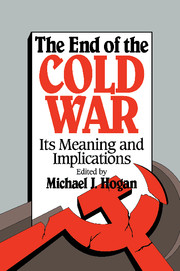Book contents
- Frontmatter
- Contents
- Preface
- The Authors
- Dedication
- 1 Introduction
- 2 An End to Which Cold War?
- 3 The Cold War, the Long Peace, and the Future
- 4 Quiet Cataclysm: Some Afterthoughts on World War III
- 5 Some Lessons from the Cold War
- 6 Nuclear Weapons and European Security during the Cold War
- 7 Victory in the Postwar Era: Despite the Cold War or Because of It?
- 8 The Wicked Witch of the West is Dead. Long Live the Wicked Witch of the East
- 9 The End and the Begining
- 10 A Balance Sheet: Lippmann, Kennan, and the Cold War
- 11 Why Did the Cold War Arise, and Why Did It End?
- 12 A View from Below
- 13 The End of the Cold War and the Middle East
- 14 The End of the Cold War in the Near East: What It Means for Historians and Policy Planners
- 15 After the Cold War: The United States, Germany, and European Security
- 16 The End of the Cold War: A Skeptical View
- 17 The End of the Cold War, the New Role for Europe, and the Decline of the United States
- 18 The Fading of the Cold War—and the Demystification of Twentieth-Century Issues
- 19 The U.S. Government, a Legacy of the Cold War
- 20 Foreign Policy, Partisan Politics, and the End of the Cold War
- 21 Beyond Bipolarity in Space and Time
- 22 A Usable Past for the Future
- Selective Bibliography
- Index
15 - After the Cold War: The United States, Germany, and European Security
Published online by Cambridge University Press: 18 December 2009
- Frontmatter
- Contents
- Preface
- The Authors
- Dedication
- 1 Introduction
- 2 An End to Which Cold War?
- 3 The Cold War, the Long Peace, and the Future
- 4 Quiet Cataclysm: Some Afterthoughts on World War III
- 5 Some Lessons from the Cold War
- 6 Nuclear Weapons and European Security during the Cold War
- 7 Victory in the Postwar Era: Despite the Cold War or Because of It?
- 8 The Wicked Witch of the West is Dead. Long Live the Wicked Witch of the East
- 9 The End and the Begining
- 10 A Balance Sheet: Lippmann, Kennan, and the Cold War
- 11 Why Did the Cold War Arise, and Why Did It End?
- 12 A View from Below
- 13 The End of the Cold War and the Middle East
- 14 The End of the Cold War in the Near East: What It Means for Historians and Policy Planners
- 15 After the Cold War: The United States, Germany, and European Security
- 16 The End of the Cold War: A Skeptical View
- 17 The End of the Cold War, the New Role for Europe, and the Decline of the United States
- 18 The Fading of the Cold War—and the Demystification of Twentieth-Century Issues
- 19 The U.S. Government, a Legacy of the Cold War
- 20 Foreign Policy, Partisan Politics, and the End of the Cold War
- 21 Beyond Bipolarity in Space and Time
- 22 A Usable Past for the Future
- Selective Bibliography
- Index
Summary
The onset of the Cold War was, at least in part, caused by the struggle over how to incorporate Germany into the postwar order. Despite total military defeat, the devastation of its economic base, and the loss of its political sovereignty, Germany remained a potentially important European power. If its economic and military potential could be controlled by either the United States or the Soviet Union, it might well determine which side emerged victorious in the Cold War. Today, as Europe, the republics of the former Soviet Union, and the United States begin to fashion a new European order, Germany will again play a pivitol role. Indeed, many of the ideas and concerns that governed the thinking of policymakers during the postwar era, as to how to end the division of Germany and still maintain the stability and security of Europe, will reemerge as contemporary leaders try to forge a post-Cold War order on the Continent.
Two interconnected concepts shaped American foreign policy toward Europe in the 1940s and 1950s, and continued to play a role until recent events led to revolutionary changes in Eastern Europe and “solved” the German question in a way that most policymakers would earlier not have believed possible. These two concepts, “the containment of the Soviet Union” and “security for and from Germany,” complemented each other. Together they meant that there would be no return to “fortress America” or to the political isolation that had characterized the interwar years. They also implied that neither the neutralization of Germany, nor the creation of a power vacuum in Central Europe, would be tolerated.
- Type
- Chapter
- Information
- The End of the Cold WarIts Meaning and Implications, pp. 175 - 184Publisher: Cambridge University PressPrint publication year: 1992



